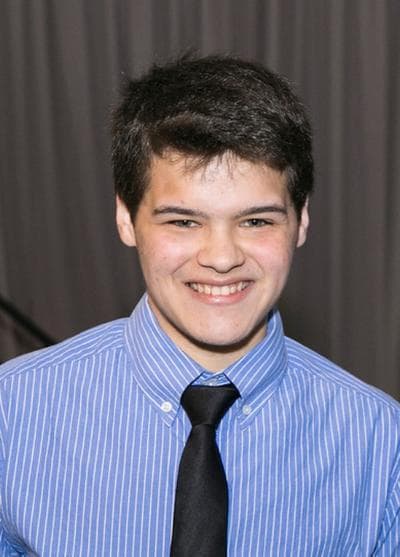Advertisement
One Teenager's Female-To-Male Story: Going Through Puberty Twice
Zachary went through puberty twice, first as a girl, then as a boy, after he started taking hormones. “The second time was a lot better,” he said. “I got excited when my voice cracked, and when I started to smell different,” though he adds that excitedly telling friends that you smell really bad is kind of a conversation killer.
Zachary is transgender. He was born female but he has always known, even before he could articulate it, that he is male. His journey has been challenging, and he suffered from depression for many years as a result. But he is now a confident, happy, inspiring young man.

Last month, Zachary, 19, graduated from Methuen high school. He'll start Wheelock College in the fall, where he has received the four-year, $20,000 annual Passion for Action scholarship for his demonstrated commitment to community service, leadership and scholarship. He plans to become a social worker with the goal of working with LBGT (lesbian, gay, bisexual, and transgender) kids.
Medically, a transgender person can choose to pursue hormonal treatment and/or surgery in order to bring the biological sex closer to the gender identity, though no intervention is a necessity. For female to male trans people, like Zachary, the surgical options include removal of the reproductive organs, “top surgery” (mastectomy), or “bottom surgery” (construction of male genitalia). For now, Zachary has chosen to pursue hormones, removal of his uterus and ovaries and top surgery, but doesn’t feel that he needs to have bottom surgery. He stresses that this is a personal decision, and that no two transgender people are the same.
Sexual orientation among transgender people is equally varied. Zachary identifies as bisexual.
He has dated females in the past and currently has a boyfriend who is a female to male trans like himself. Their shared experiences have brought them very close.
I have learned a tremendous amount from Zachary. I now better understand that people are born with a biological sex and a gender identity, and that these don’t always match up. Trying to ignore ones gender identity, or to force it to align with ones biological sex when this doesn’t feel right, is painful and psychologically detrimental. To feel whole, gender identity must be embraced, but when there is incongruity between biological sex and gender identity, as is the case for transgender individuals, society doesn’t make this easy.
Most importantly, Zachary has taught me that we all need to educate ourselves and develop tolerance toward transgender individuals. He is a person with tremendous courage and integrity, but he has been forced to deal with a more difficult set of decisions than most of us, and with societal discrimination.
This week, the Joint Committee on the Judiciary in Massachusetts held a hearing to determine the future of the Equal Access Bill.
This bill would add “gender identity” to the Massachusetts civil rights law for public accommodations. As it stands, this law prohibits discrimination on the basis of “age, race, creed, color, national origin, sexual orientation, sex and marital status” in public accommodations, but does not protect transgender individuals. Put simply, this means that Zachary could be denied service or treated unfairly in a restaurant, an airport, a retail store, a public bathroom, on public transportation and so on. According to a national transgender discrimination survey published this year, up to 50% of transgender individuals in Massachusetts have experienced verbal harassment or mistreatment in public accommodations.
(Dr. Annie Brewster, who also produced the audio above, is a Boston internist who became interested in storytelling as a way to promote healing among patients. You can hear and read more of her stories here, here and here, as part of our Listening To Patients series.)
